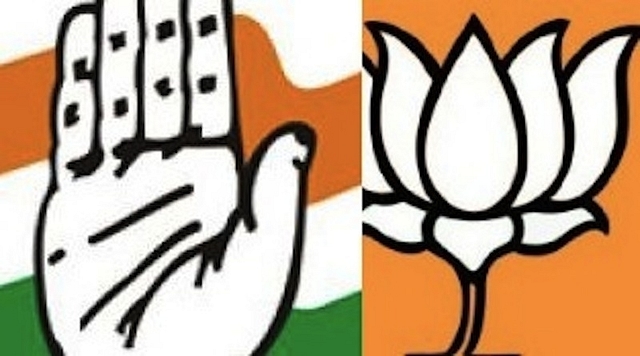
Despite Some Bruises, Anandiben Patel Retains Her Poise In Gujarat
Now that the dust has settled on the results of the local body elections in Gujarat, what do they foretell for the future of the BJP and Congress in the state? Has Anandiben managed to assert her authority, or has the BJP lost popularity post the move of Modi to Delhi?
This article will attempt to analyse the prevalent political atmosphere in Gujarat and how well the BJP and Congress are prepared to face the elections next year. Enough has been written and spoken in mainstream media about the dwindling fortunes of BJP in Gujarat, especially after the recent quota stir by the Patel (aka Patidar) community. In fact, the Lutyens media was gleefully hoping for a complete rout of the BJP in the local body elections. However, contrary to expectations and predictions of many, the BJP came out largely unscathed. Barring the rural areas, i.e. the panchayats, which are anyway not seen as a stronghold of BJP, it managed to save face and it would not be wrong to say that it put a stellar performance in semi-urban and urban areas, viz. the Nagarpalika and municipal corporations.
In fact, it completely dominated the municipal corporations, setting the score 8-0. These elections were touted as a litmus test for incumbent Chief Minister Anandiben Patel and she emerged a clear winner, albeit with minor battle bruises. Some political analysts often remark that local body elections are hardly a barometer of the people’s mood, but we all know how the mainstream media narrative would have transpired had the BJP lost badly in the urban areas too.
While there is no palpable election activity on the ground, to believe that the political parties are not gearing up for next year’s assembly elections would be too naive an assumption. Gautam Shah, the recently-elected mayor of the Ahmedabad Municipal Corporation, is called the right hand man of Amit Shah by the regional Gujarati media. This is enough of an indication of the seriousness the BJP is showing towards the 2017 elections and how important Ahmedabad (21 assembly seats) and the urban vote is for the party.
After the elevation of Narendra Modi as PM, it has not been an easy ride for Anandiben Patel. With too many contenders for the CM’s post initially, taking the reins and running the government in Gujarat seemed a daunting challenge for anyone. It would be safe to state here that she has done well and, barring the initial hara-kiri during the quota stir, has largely managed to govern the state as per the template set by Modi. In fact, her tough stance and refusal to succumb to the demands and pressure tactics of quota leaders were lauded by many.
(SAM PANTHAKY/AFP/Getty Images)
Since assuming the role of chief minister, Anandiben Patel has embarked on a slew of social security schemes. Yet her initiatives and schemes often miss the charisma of Modi and his catchy acronyms and phrases. With the quota stir losing steam and getting subdued, she is expected to tighten her grip over the state’s polity and governance.
Congress, on the other hand, seems to be in perpetual disarray in Gujarat. The local body elections were proclaimed as a resurrection platform for the party, but it failed to capitalise on them. The party even meddled with the quota stir to extract some political advantage but could not get any significant improvements.
The long absence from power in Gujarat has only added to its woes. After dominating the political sphere for around three decades post the creation of the state in 1960, the Congress eventually began losing its grip on Gujarat and the BJP first assumed power in the 1990 state elections through an alliance with Janata Dal. It would now be more than two decades since the Congress has remained out of power in Gujarat. Such a long hiatus is bound to put even the oldest political party in disarray as is evident by the state of the Congress in Gujarat. Many of its veteran and influential leaders have joined the BJP, notable among these being Narhari Amin and Vithal Radadia. With such leaders leaving the party and the persona of Modi looming large over the state for more than a decade, the party organisation crumbled and the workers’ motivation suffered a dip. Now, in the absence of any strong anti-incumbency and their inability to strike a broad social coalition, it clearly seems a tough road ahead for Congress.
Will the BJP be able to retain its hold in urban Gujarat or will the first Assembly elections sans Modi in Gujarat see a change in the fortunes of Congress? Undoubtedly it will be an interesting year ahead for political observers in Gujarat.